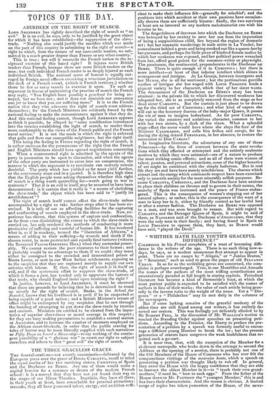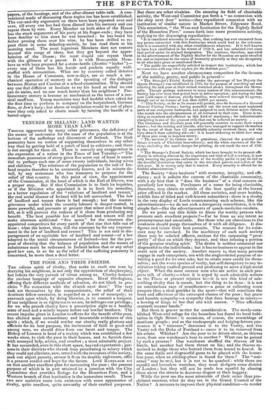"WHITHER IIATH FLED YOUTH'S GRACEFUL DIFFIDENCE?"
COLERIDGE in his Friend complains of a want of becoming diffi- dence in the writers of the age. There is no such thing now-a- days, he say s, as a modest anonymous first attempt to appear in print. There are no essays by " Aliquis," or "Junius Brutus," or " Scrutator," such as used to grace the pages of old SILVA/MS URBAN. In so far as the scribbling genus are concerned, the com- plaint is perhaps overcharged. True, in our Monthlies and Annuals the names of the authors of the most trifling contributions are ostentatiously paraded at full length in staring capitals. Periodical literature has become a kind of Barmecide's feast, at which the most patient public is expected to he satisfied with the names of authors in lieu of their works ; the value of each article being gene- rally in the inverse ratio to the weight of the name. Yet a " Dio- genes " or a " Philalethes " may be met daily in the columns of the newspapers.
But if some lurking remains of the graceful modesty of the olden time are still found among our writers, it has entirely de- serted our orators. This was feelingly yet delicately alluded to by Sir ROBERT PEEL, in the discussion of Mr. WALLACE'S motion to rescind the Standing Order against speeches on presenting peti- tions. According to the Premier, the liberty to preface the pre- sentation of a petition by a speech was formerly useful to encou- rage a diffident young Member to break the ice ; but the present generation of orators have outgrown the weak bashfulness that re- quired such a go-cart.
It is most true, that, with the exception of the Member for a ci-devant metropolis who broke down in the attempt to second the Address at the opening of a session, there is probably not one of the 658 Members of the House of Commons who has ever felt the compunctious visitings of the snauvaise honte, which a speech on presenting a petition was thought likely to rub off. In general, they enter the House with the happy confidence that they are able to instruct the oldest Member in it—to " teach their own grand- mothers," if need be, " how to suck eggs." From the father of the House down to Mr. ParrisoN the "youngest Member," this is and has been their characteristic. And the reason is obvious. A limited range of topics has taken possession of the House, of the news-
papers, of the hustings, and of the after-dinner table-talk. A con- ventional mode of discussing these topics too has been established. The cut-and-dry arguments on them have been repeated over and over, till every one has had them dinned into his memory and can repeat them by rote. Every Member on both sides of the House has the stock arguments of his party at his finger-ends ; they have been familiar to him since he was breeched : be has heard his father prosing them over his wine, he has been drilled to re- peat them in some debating-society, he has read them at his morning meal. The most ingenious Members dare not venture beyond this range of ideas, lest they get beyond the appre- hension of the House ; the most stupid can repeat them with the glibness of a parrot. It is with Honourable Mem- bers as with boys prepared for a stone-battle (Scoald "bicker ")— every one of them has his hands and pockets equally well- stuffed with ammunition. What are by courtesy called debates in the House of Commons, now-a-days, are as much a me- chanical operation of memory as the spouting of the dialogue between Brutus and Cassius at a school-examination. Why should any one feel diffident or hesitate to try his hand at what no one can do amiss, and no one much better than his neighbour ? Par- liamentary oratory is become as mechanical as the tunes of a mu- sical snuffbox. Young musicians may feel bashful when asked for the first time to perform in company on the harpsichord, German flute, or Jew's harp ; but alarm or trepidation would be out of place were they only asked to churn music by turning the handle of a barrel-organ.



























 Previous page
Previous page